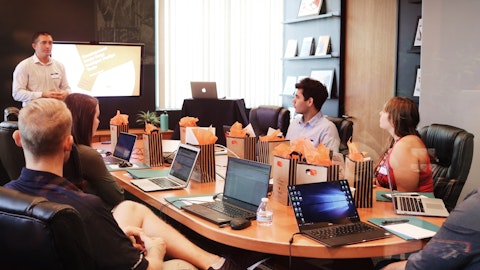Mark Marcon: Great. And then, Kate, obviously, everybody is talking about the macro environment. The majority of economists are projecting a recession for this year. Philosophically, how should we think about — if we end up having a mild recession, which seems to be the consensus, how should we think about what the impact would be on the top line? And to what extent — how should investors think about the level of profitability that you could maintain if we end up going into a mild recession?
Kate Duchene: Yes. We’re very committed, Mark, to maintaining the profitability range we’ve set. We’ve said on an annual basis, we want to be in the mid-teens. That’s different than 10 years ago, and we’re very committed to it. So, while I think a mild recession — and you’ve started to see in these results, it’s hitting us a little bit on the top line. We’re delivering, we’re continuing, especially in the quarter we’re just reporting record profitability, and we’re not giving that up. I mean we’ve made moves in the business to lower our cost structure, and we’re continuing to do that with upgraded technology and the ability to do more with technology so we can bring headcount cost down. We’ve always said the two biggest costs for us are headcount and real estate, and we’ve made moves on both, and we continue to do so. So, I’m very optimistic that we will continue to deliver results on the bottom line in this business.
Operator: Our next question comes from Marc Riddick with Sidoti. You may proceed.
Marc Riddick: So, I wanted to — a lot of my main questions have already been covered, but I did want to touch on — first of all, I appreciated you sharing and undertaking the test, which sort of going through the survey that you referred to. And I was wondering if you could sort of talk a little bit about that. It seems as though it was pretty extensive, so sort of thinking about a couple of things that came out of that. But could you sort of talk a little bit about maybe the — were there any of the learnings that you got from that outside of where you thought they would be? And has that led to any changes that you thought you needed to make operationally? And then also maybe just from — I’m looking forward to actually seeing it, but was there sort of a — what was the time frame of when you guys did that?
Kate Duchene: We did conduct the survey largely in November. I think we started it at the end of October, but largely completed it in November. We did a preview of our findings in New York City on November 30th. And like I said, Marc, we’ll be publishing the full report in the next two weeks. So, we will issue a press release. I would say the surprising thing for me or the surprising insight is the accelerating use of organizationally diverse teams. And while — that’s rapidly expanding in the companies that are leading in terms of their own project delivery and recognizing that the talent you have around the table that runs day-to-day operations is not necessarily the talent you need to drive change. And so, I think as more organizations recognize that, that presents opportunity for companies like ours to be the right partner.
And finally, companies starting to think about their human capital supply chains very differently, and the advent of technology is allowing them to do it. I think we’ve all learned so many lessons coming out of COVID that is really an interesting time to be in a human capital business because, finally, the world is catching up to our business model, and that feels very good. So, while this upcoming quarter may have some top line challenge, the longer term trends are really moving in our favor. And while we read today in The Wall Street Journal that bosses are demanding people come back to the office, I think it’s still really up in the air whether talent is going to respond to that in the right way. I think talent clearly has choices today, and our business model is one of them.
So, the research I think confirmed where we are as a business more than surprised me.
Marc Riddick: Okay. Excellent. And thank you for that. And then, there’s been several comments on the positive bill rate environment and what you’re seeing there. Is there any — is there much of a change at all as far as business mix that’s helping that, or is that just there has been — there just continues to be then with the pricing improvement
Tim Brackney: Hey Marc, this is Tim. I just — I lost you a little bit there. You kind of — at least on my end got a little garbled. Do you mind repeating the question? I’m happy to give you some color.
Marc Riddick: Sure, sure. I was asking about sort of the contributions on bill rate and maybe what you see going forward there, whether that was a business mix benefit or is that just sort of just pushing to pricing and the room that we may have for that going forward.
Tim Brackney: I think it’s a good question. I mean it’s a little bit of both. But right now, it’s more really just pricing discipline and less of a mix shift for us. In reality — Mark asked a question about kind of where we saw the Big 4, like — I mean, we realize that our pricing value to market, there’s a huge opportunity for us. That’s a big focus for us across the business. However, as we take on more project consulting projects where we’re actually responsible for the deliverable and doing more of that type of work, we will command higher bill rates and higher margins. And we think there’s more opportunity for that now for us to shift share from some of the larger firms as people think about value.



